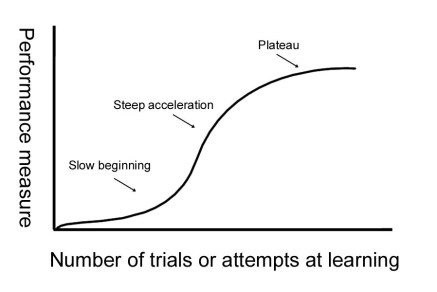“My students are at a dead end with the language”. “They seem to be going in circles”. “They feel stuck”. Sounds familiar? Despite the fact that this issue is well-known to many teachers, let’s start with the definition.
What’s a plateau?
“It’s a state of little or no change following a period of activity or progress”, © Oxford English Dictionary.
How do we apply this to English learning?
Learners feel as if their progress has slowed down drastically. They see no difference in and development of their level for a very long time.
Actually, it’s a part of the learning natural process.
 Students reach this level and they have to persist to overcome it, but you can also help them.
Students reach this level and they have to persist to overcome it, but you can also help them.
Why does it happen and what do you do?
There can be a number of reasons but I would emphasize three main points that I consider the most essential and give some tips.
Reason 1 — Lack of practice and activation and production of the new complex language.
When learners are at the start, it’s easier for them to apply new knowledge, however, when they are to get to grips with more complicated structures, it becomes a challenge to put it into practice.
Solutions:
Practice makes perfect. So your job as a teacher is to provide students with more opportunities to use the language:
- pay attention to and focus on your learners’ problem areas and weak points. Create exercises and tasks where learners can practise this particular language in both controlled and freer settings;
- expose them to as much “real” language in class as possible. Watch authentic videos, listen to real audio and different programmes; give articles to read.
- make them integrate language in their life: music, TV series, podcasts, magazines, news, blogs, vlogs, social network, penpals, searches in English, language swap communities, phone language, etc. It all depends on their interest.
- work with the emerging language. When students look for a word in English, but cannot remember it or just don’t know, just give it to them, but provide some other examples of use. Create a list of such words or phrases on the board, revise them at the end of the lesson. Set a task for homework where students can practise this language once again to reinforce it, e.g. gap-fill exercise or they can write an essay where they have to use some of the phrases;
- when you set a task, make sure students use the target vocabulary or grammar;
- if students speak in a “simple” way, do phrase/sentence transformation exercises right after the task or as a delayed error correction. Write what they said on board and have the whole group brainstorm ideas on how it can be “sophisticated”. For example, if it can be substituted with phrasal verbs, idioms or collocations. You may also create an exercise for homework: send the students the list of sentences and a keyword for each that they have to use in a new sentence to make it more “complex”.
- revise the language constantly. Start and finish each lesson with the revision game of the material, for example, play a word game, where one student explains a word or a phrase, and another has to guess. Or create a board game where students have to make or transform sentences, complete the phrases, give definitions, etc.
Reason 2 — Lack of motivation
We are all more enthusiastic at the very beginning of anything we start doing. However, the excitement fades away soon and it becomes much more difficult to keep students motivated, to inspire them. It also happens when students have reached their goal, e.g. passed an exam, and do not see any other reasons or aims for studies. Not having objectives can pause the language learning process.
Solutions:
- define goals with the students to have a clear aim;
- get to know your students better and personalise the course for them, make a tailor-made course. For example, you teach a general Business course but there are students from different departments: Finance, HR, Legal, etc. You can integrate some skills’ exercises that correlate with their field. You can create role-play tasks where they have to deal with a problem a company faces from their point of view: financial, legal, etc. It’s great if they can share a problem they have and apply English to real situation. You may
- find materials that are relevant to them and they can easily adapt and use in their life;
- encourage students to participate in Speaking clubs. They can take advantage of that: they will meet other learners, exchange and share their experience, and, well, it’s easier to study together in some way;
- change your teaching methods: try out what you’ve never done before, e.g. TBL, Dogme, etc. This will get both you and your students out of the comfort zone.
Reason 3 — Fossilized errors and “artificial” language
When we learn a new language, it’s quite important to be exposed to the correct model of “speech”, grammar, pronunciation, use of vocabulary, etc. Otherwise, we remember the wrong structures or mistakes and do not sound natural. And even if we have talked to many native speakers, it doesn’t mean we can acquire a good model and we’ll be corrected if we say something wrong. Usually, native speakers do not pay attention to slips if the message is got across. That’s why learners need teachers.
Solutions:
- pay attention to fossilized errors and correct them;
- make sure you provide the students with the natural model of language;
- have students transform or rephrase the sentences or phrases if they sound bizarre;
- expose students to as much of real language as possible and make them notice set expressions, collocations, idioms, phrasal verbs, etc.
- watch this lecture by Scott Thornbury, “Fossilization: Is It Terminal, Doctor?”. He is discussing the methodology of moving language learners beyond the “plateau” of understanding to a higher plane of language.
I also advise you to read the article by Jack C. Richards “Moving Beyond the Plateau: From Intermediate to Advanced Levels in Language Learning”.
Good luck with overcoming the Intermediate plateau! Hope this “road” to the next level will be smooth, not bumpy!






 Вероника Аветисян
Вероника Аветисян 
 Маргарита Аветисян
Маргарита Аветисян 


